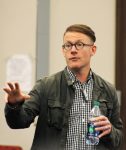Crowds spilled out of Paris-Yates Chapel on Tuesday night as students waited to experience a first-person account of history.
Renowned speaker, author and Holocaust survivor Marion Blumenthal Lazan took to the stage to recount not only the dark details of her childhood living in a concentration camp but also to describe her life following the liberation and give words of wisdom on respect, kindness and perseverance.

The UM Hillel and Jewish Federation of Oxford co-sponsored Lazan’s public talk, which ended in a standing ovation.
Lazan began by recognizing the difference between natural disasters such as Hurricane Harvey and mass genocides such as the Holocaust.
“Unfortunately, there is so very little we as humans can do against the ravages of nature,” Lazan said. “In contrast, 9/11, the ongoing genocide and the Holocaust of the second world war were all carefully planned, orchestrated and carried out by men.”
Lazan was 4 years old in 1935 when the Nuremberg Laws were enforced and regulated the lives of Jewish people in Germany. Lazan was forced to wear the yellow Star of David, which signified her isolation from the rest of society.
Lazan’s family members planned to flee to the United States. Just one month before their departure, the Nazis invaded Holland, where she and her family were awaiting escape.
Even though she was only 9 years old, Lazan said she still remembers the vicious German soldiers and their attack dogs who came to take her and her family off to the concentration camps.
“To this day, I still feel a certain sense of fear whenever I see a German shepherd,” Lazan said.
The concentration camp was so bitter cold, Lazan said, that the prisoners used their own urine to warm up their hands. She said her body and clothes were infested with lice.
“I know that you’ve all read, studied and seen movies, but the foul odor, the filth, continuous horror and fear surrounded by death is indescribable,” Lazan said. “There is no way that this can be put accurately into words or pictures.”
In order to survive the concentration camp, Lazan said she invented her own make-believe games.

Finally, in 1945, the Russian army liberated the train en route to eastern Europe inside which Lazan and her mother had been detained for two weeks.
“Although we were all weak, ill and exhausted, I vividly remember the spring of 1945 – flowers were in bloom; the birds were singing,” Lazan said. “It was a wonderful feeling to be free at long last.”
Lazan, her mother and older brother all eventually moved to Illinois, where Lazan was introduced to a new language and life.
Even though Lazan was far behind in school, she ended up graduating on time and was ranked eighth in her class.
Lazan also met her husband in high school in Illinois. The two celebrated their 64th wedding anniversary this year.
“Despite all the terrible things that happened to me as a child, my life today is full,” Lazan said.
Lazan reminded the audience to share and pass on Holocaust stories.
“In a few short years, we will not be here any longer to give a first-hand account,” Lazan said. “When we’re not here any longer, it is you, the young people here this evening who will have to bear witness.”
In addition, Lazan urged the audience members not to take their freedom for granted, to respect the beliefs of others and to examine the intentions of leaders before blindly following them.
“Each and every one of us must do everything in our power to avoid such hatred,” Lazan said. “Regardless of our religious belief, regardless of the color of our skin, regardless of the national origin, this respect toward one another must begin.”
Krista Oliver, a junior broadcast journalism major, said the timing of the talk was great.
“It’s so relevant with Charlottesville,” Oliver said. “It’s just a reminder that this did happen and those that want it to happen again – I don’t get it at all.”
















